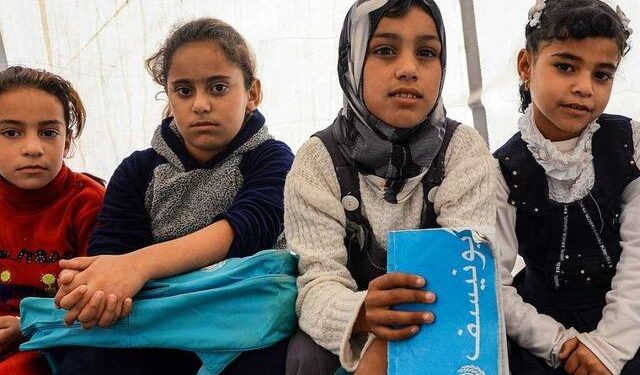UNHCR Operational Overview: Central Asia Faces Escalating Humanitarian Challenges (January 2025 – March 2025)
The humanitarian landscape in Central Asia is experiencing profound transformations, prompting the United Nations High Commissioner for Refugees (UNHCR) to release its operational overview for the first quarter of 2025. This document highlights critical developments and pressing challenges confronting displaced populations in the region. A confluence of escalating conflicts, climate change effects, and increasing migration trends has resulted in a heightened demand for humanitarian assistance. Considering these complexities, UNHCR’s commitment to safeguarding the rights and well-being of refugees, internally displaced persons (IDPs), and asylum seekers is more crucial than ever. This article delves into key insights from the operational overview while examining on-the-ground realities and strategies designed to address the immediate needs of vulnerable groups in Central Asia.
UNHCR Tackles Increasing Displacement Challenges in Central Asia
The UNHCR has intensified its efforts to address rising displacement issues across various Central Asian nations, exacerbated by socio-economic pressures and geopolitical tensions. Collaborating with local governments and international partners, UNHCR has deployed emergency response teams to assess conditions on the ground and support vulnerable populations affected by forced displacement. Key initiatives include:
- Field Assessments: Rapid evaluations conducted in border areas to identify the needs of displaced individuals.
- Resource Provision: Distribution of vital supplies such as food items, shelter materials, and medical care to impacted communities.
- Capacity Building: Training local organizations on best practices related to refugee protection and crisis management.
The dedication of UNHCR towards upholding the rights of displaced individuals is underscored through ongoing advocacy aimed at reforming policies that enhance protective measures throughout the region.Engagements with government officials have focused on developing lasting solutions that facilitate both integration into host communities and also reintegration into home regions. A summary of collaborative projects includes:
| Project Name | Aim | Pursued Outcome |
|---|---|---|
| Cross-Border Support Initiative | Create secure pathways for asylum seekers | Diminished risk associated with human trafficking incidents |
| Sustainability Initiatives | Cultivate community support networks | Improved living standards for displaced families |
Assessing Humanitarian Needs and Resource Allocation for Refugees
The UNHCR has identified urgent humanitarian needs among refugees within Central Asia amid ongoing geopolitical turmoil coupled with economic difficulties.As reported in March 2025, an increasing number of displaced individuals are facing dire situations that require immediate interventions aimed at protecting their basic rights as well as their survival.The primary necessities have been categorized into several areas:
- Nutritional Access: Many families are struggling with food shortages due to rising prices worsening their vulnerability.
< - Healthcare Accessibility: Limited medical facilities have left numerous refugees exposed especially those suffering from chronic health conditions or disabilities.
< - Safe Housing: Substandard housing conditions have led to increased exposure risks resulting in various health complications.
< - Child Education: Displacement has interrupted educational attendance raising concerns about young refugees’ future learning opportunities.
<
<
<
<
A systematic approach towards resource allocation aims at effectively addressing these urgent demands while ensuring fair distribution.A strategic emphasis on collaboration between local authorities NGOs ensures optimal utilization resources.The following table illustrates prioritized resource allocation planned for Q1 2025 :
| Type Of Resource <th Allocated Budget(USD) <th Target Beneficiaries |
|---|
</section
Strategic Recommendations For Improving Support Systems And Local Integration
A range targeted measures must be implemented enhance effectiveness support systems catering specifically towards refugees IDPs within central asia.< Strong Enhanced Collaboration< / Strong among governmental bodies NGOs local communities remains crucial ensure comprehensive responses addressing vulnerabilities populations.This entails establishing multi-stakeholder partnerships facilitating sharing resources knowledge best practices.Moreover capacity-building initiatives directed toward empowering local actors should take precedence enabling them provide tailored services tackling unique challenges faced by refugee groups.Such programs can strengthen integration efforts fostering resilience inclusivity within communities.
Additonally implementing community-based frameworks can significantly contribute promoting sustainable development.These frameworks ought prioritize improving access essential services including education healthcare vocational training available displaced individuals.Moreover it’s imperative cultivate positive public perception regarding refugees through awareness campaigns showcasing contributions made toward enhancing cultural diversity economies.Local governments should be supported creating inclusive policy environments safeguarding refugee rights while encouraging participation decision-making processes.In summary integrating refugees into host societies transcends mere humanitarian obligation; it represents investment unified prosperous future all stakeholders involved.
<h2 id= "conclusion-insights-and-conclusions" Insights And Conclusions
To sum up this operational update issued by UNHCR covering January-March highlights ongoing struggles resilience exhibited addressing needs diverse populations facing displacement central asia.As regional dynamics shift persistently evolving humanitarian requirements remain paramount commitment shown by unchr partners delivering aid protection those affected conflict dislocation collaborative endeavors outlined herein not only emphasize urgency action but also pave way sustainable solutions vulnerable communities.Moreover continued backing from international entities will prove indispensable ensuring dignity rights upheld amidst uncertain times ahead monitoring implications developments closely remains necessary fostering hope resilience safety stability lives seeking refuge new beginnings.















